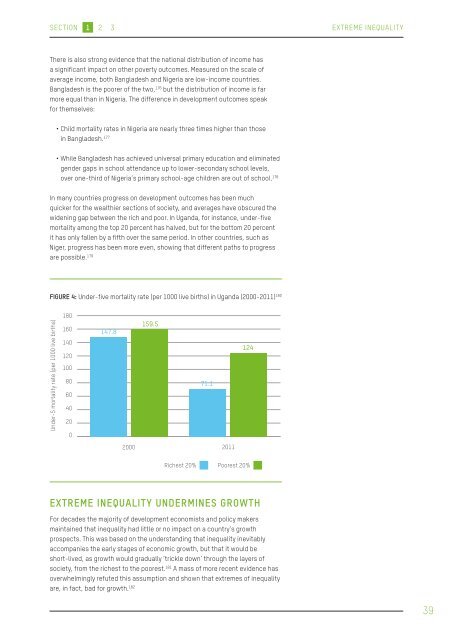1FW2e8F
1FW2e8F
1FW2e8F
You also want an ePaper? Increase the reach of your titles
YUMPU automatically turns print PDFs into web optimized ePapers that Google loves.
SECTION 1 2 3<br />
EXTREME INEQUALITY<br />
There is also strong evidence that the national distribution of income has<br />
a significant impact on other poverty outcomes. Measured on the scale of<br />
average income, both Bangladesh and Nigeria are low-income countries.<br />
Bangladesh is the poorer of the two, 176 but the distribution of income is far<br />
more equal than in Nigeria. The difference in development outcomes speak<br />
for themselves:<br />
• Child mortality rates in Nigeria are nearly three times higher than those<br />
in Bangladesh. 177<br />
• While Bangladesh has achieved universal primary education and eliminated<br />
gender gaps in school attendance up to lower-secondary school levels,<br />
over one-third of Nigeria’s primary school-age children are out of school. 178<br />
In many countries progress on development outcomes has been much<br />
quicker for the wealthier sections of society, and averages have obscured the<br />
widening gap between the rich and poor. In Uganda, for instance, under-five<br />
mortality among the top 20 percent has halved, but for the bottom 20 percent<br />
it has only fallen by a fifth over the same period. In other countries, such as<br />
Niger, progress has been more even, showing that different paths to progress<br />
are possible. 179<br />
FIGURE 4: Under-five mortality rate (per 1000 live births) in Uganda (2000‐2011) 180<br />
Under-5 mortality rate (per 1000 live births)<br />
180<br />
160<br />
140<br />
120<br />
100<br />
80<br />
60<br />
40<br />
20<br />
0<br />
147.8<br />
159.5<br />
71.1<br />
124<br />
2000<br />
2011<br />
Richest 20% Poorest 20%<br />
EXTREME INEQUALITY UNDERMINES GROWTH<br />
For decades the majority of development economists and policy makers<br />
maintained that inequality had little or no impact on a country’s growth<br />
prospects. This was based on the understanding that inequality inevitably<br />
accompanies the early stages of economic growth, but that it would be<br />
short-lived, as growth would gradually ‘trickle down’ through the layers of<br />
society, from the richest to the poorest. 181 A mass of more recent evidence has<br />
overwhelmingly refuted this assumption and shown that extremes of inequality<br />
are, in fact, bad for growth. 182<br />
39


